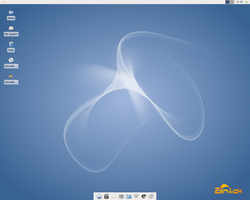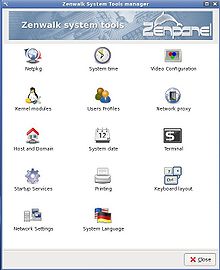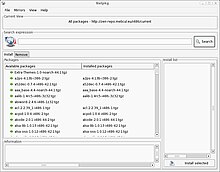Linux distribution
 | |
 Zenwalk 6.0 Zenwalk 6.0 | |
| Developer | Jean-Philippe Guillemin |
|---|---|
| OS family | Linux (Unix-like) |
| Working state | Current |
| Source model | Open source |
| Latest release | 15.0-221106 |
| Update method | netpkg (xnetpkg) |
| Package manager | netpkg |
| Kernel type | Monolithic (Linux) |
| Default user interface | Xfce |
| License | Various |
| Official website | www |
Zenwalk GNU/Linux is a desktop-focused Linux distribution founded by Jean-Philippe Guillemin. It is based on Slackware with very few modifications at system level making it 100% compatible with Slackware. It aims to be a modern, multi-purpose Linux distribution by focusing on internet applications, multimedia and programming tools. It comes with many specialized tools and is designed for beginners and advanced users alike, as it offers system configuration via both graphical tools and the command line.
History
Zenwalk was originally called Minislack up to version 1.1. It was renamed with version 1.2, released on 12 August 2005. Originally using KDE as its desktop environment, it moved to Xfce with version 0.3, although GNOME and KDE packages have always been available separately.
Aims

The Zenwalk Project aims to create a lightweight Linux distribution, through using only one application per task on the release ISO image; optimization for a specific instruction set architecture, to increase execution speed; and introducing a comprehensive package management system with dependency resolution.
Package management

Zenwalk uses the netpkg package management system. Developed in-house, it provides the main functionality of the apt-get variety of package managers. It uses Slackware's .tgz package format, but adds dependency resolution capabilities. It uses meta files to provide dependency information, as well as package description during the install process. This convenience is available only to the official Zenwalk mirrors listed in the netpkg configuration file, netpkg.conf. In addition to the original netpkg command line interface, xnetpkg provides a GUI frontend with similar capabilities.
Zenwalk is also compatible with Slackware package management tools such as slapt-get and its frontends, and have similar functionality as that of netpkg.
As of Zenwalk 4.6, package compatibility with Slackware is still maintained. Slackware packages may be used in place of Zenwalk packages where necessary.
| version | date |
|---|---|
| Minislack 0.1 | May 21, 2004 |
| Minislack 0.2 | August 8, 2004 |
| Minislack 0.3 | February 17, 2005 |
| Minislack 0.4 | March 26, 2005 |
| Minislack 1.0 | April 24, 2005 |
| Minislack 1.0.1 | May 3, 2005 |
| Minislack 1.1 | June 10, 2005 |
| Zenwalk 1.2 | August 12, 2005 |
| Zenwalk 1.3 | October 15, 2005 |
| Zenwalk 2.0 Core | November 27, 2005 |
| Zenwalk 2.0.1 | December 4, 2005 |
| Zenwalk 2.1 (Core) | January 18, 2006 |
| Zenwalk 2.2 | February 16, 2006 |
| Zenwalk 2.4 | April 4, 2006 |
| Zenwalk 2.6 | May 23, 2006 |
| Zenwalk 2.8 | July 21, 2006 |
| Zenwalk 3.0 | September 8, 2006 |
| Zenwalk 4.0 | November 20, 2006 |
| Zenwalk 4.2 | January 6, 2007 |
| Zenwalk 4.4 | February 22, 2007 |
| Zenwalk 4.4.1 | February 24, 2007 |
| Zenwalk 4.6 | June 1, 2007 |
| Zenwalk 4.6.1 | June 6, 2007 |
| Zenwalk 4.8 | October 6, 2007 |
| Zenwalk 5.0 | January 18, 2008 |
| Zenwalk 5.2 | June 7, 2008 |
| Zenwalk 6.0 | March 7, 2009 |
| Zenwalk 6.2 | September 6, 2009 |
| Zenwalk 6.4 | May 27, 2010 |
| Zenwalk 7.0 | Mar 25, 2011 |
| Zenwalk 7.2 | Oct 11, 2012 |
| Zenwalk 7.4 | April 2014 |
| Zenwalk 8.0 | July 2016 |
| Zenwalk 15.0 | 4 February 2022 |
Supported architectures
Starting with version 8.0, Zenwalk Linux is built and optimized primarily for the x86_64 architecture; 32-bit i486 architecture is no longer supported.
Project versions
At one time there were five main versions of Zenwalk :
- Zenwalk Standard, a distribution aimed at mainstream desktop and development use. Designed to be a stand-alone operating system, it installs to the hard drive by way of an ncurses-based installer. It includes all of the officially released software packages that are deemed most useful by the Zenwalk community. The default install also includes development packages like gcc, and some proprietary media packages (such as Adobe Flash Player) and drivers in order to provide a full featured default install. The default desktop environment is Xfce.
- Zenwalk Core (discontinued), a Zenwalk system built for user customization. Released with no X Window System binaries, its aim was to allow a skilled user to build a system fit for their needs. The project's lead developer was Emmanuel Bailleul.
- ZenLive (discontinued), a Zenwalk system built on a Live CD design. ZenLive followed the progress made by the full Zenwalk system closely, thus mirroring the version number, and attempted to stay true to the original distribution's goals. In addition, it included all of the necessary libraries and applications to develop and compile software, a particularly rare feature in Live CD distributions. The original ZenLive team left the project after version 6.0 was released but ZenwalkLive project was revived by an enthusiastic user and developed as a one-man-project. With version 6.4 the live-framework changed from deprecated linux-live-scripts to slackware-live-scripts.
- Zenwalk Gnome (discontinued), with GNOME as the default desktop environment.
- Zenwalk Openbox (discontinued), supplied with Openbox as stand-alone window manager. It was a very lightweight version of the operating system and did not use LXDE in its choice of software. It still uses Thunar File Manager over PCManFM which is standard on LXDE-based systems such as Lubuntu.
Derivatives
There are currently three known Zenwalk-based distributions:
- Arudius, a now-discontinued live CD distribution for information assurance with tools for penetration testing and vulnerability analysis
- SLAMPP, intended to be used as a home server
- Zencafe, an Indonesian distribution designed for internet cafes
Live USB
A Live USB of Zenwalk Linux for versions up to 5.2 can be created manually or with UNetbootin. Current versions of Zenwalk can also booted from a USB using Ventoy, but only for installation, not a live session.
See also
Notes
References
- "New Zenwalk Current ISO 2022 07 November is ready". Retrieved 29 December 2022.
- Guillemin, Jean-Philippe (4 February 2022). "Zenwalk GNU Linux". zenwalk.org. Archived from the original on 28 March 2022. Retrieved 28 March 2022.
- JP Guillemin (10 February 2016). "Now Zenwalk 8.0 BETA 2".
- Claus Futtrup (19 September 2005). "An introduction to Zenwalk 1.2".
- MiniSlack is no mini Slack | Tux Machines
- MiniSlack: A noteworthy Linux distribution, OSNews
- Let's Take a Zenwalk | Tux Machines
- Review: Zenwalk Linux 2.0.1, OSNews
- Zen Yourself Free: a Windows Defector Discovers ZenWalk, OSNews
- DistroWatch Weekly, Issue 239, 11 February 2008
- "Zenwalk 6 Review | LinuxBSDos.com". Archived from the original on 20 June 2018. Retrieved 20 June 2018.
- "Zenwalk 6.2 Review | LinuxBSDos.com". Archived from the original on 20 June 2018. Retrieved 20 June 2018.
- Spotlight on Linux: Zenwalk Linux 6.4 "Live" | Linux Journal
- Zenwalk 7 review | LinuxBSDos.com
- DistroWatch Weekly, Issue 427, 17 October 2011
- DistroWatch Weekly, Issue 482, 12 November 2012
- DistroWatch Weekly, Issue 674, 15 August 2016
- Mayank Sharma (14 February 2008). "Tiny Zenwalk 5.0 packs a big punch".
- Zenwalk Releases Announcements on Distrowatch Archived September 28, 2007, at the Wayback Machine
- Zenwalk 2.2 Release Announcement Archived June 24, 2007, at the Wayback Machine
- Zenwalk 2.4 Release Announcement Archived October 13, 2006, at the Wayback Machine
- Zenwalk 2.6 Release Announcement Archived June 29, 2007, at the Wayback Machine
- Zenwalk 2.8 Release Announcement Archived October 13, 2006, at the Wayback Machine
- Zenwalk 3.0 Release Announcement Archived February 23, 2007, at the Wayback Machine
- Zenwalk 4.0 Release Announcement Archived February 19, 2007, at the Wayback Machine
- Zenwalk 4.2 Release Announcement Archived February 19, 2007, at the Wayback Machine
- Zenwalk 4.4 Release Announcement Archived March 1, 2007, at the Wayback Machine
- Zenwalk 4.4.1 Release Announcement Archived August 4, 2007, at the Wayback Machine
- Zenwalk 4.6 Release Announcement Archived June 4, 2007, at the Wayback Machine
- Zenwalk 4.6.1 Release Announcement Archived July 16, 2007, at the Wayback Machine
- Zenwalk 4.8 Release Announcement Archived October 11, 2007, at the Wayback Machine
- Zenwalk 5.0 Release Announcement Archived January 20, 2008, at the Wayback Machine
- Zenwalk 5.2 Release Announcement Archived June 8, 2008, at the Wayback Machine
- Zenwalk 6.0 Release Announcement Archived March 11, 2009, at the Wayback Machine
- Zenwalk 6.2 Release Announcement Archived December 3, 2009, at the Wayback Machine
- Zenwalk 6.4 is ready ! Archived October 23, 2013, at the Wayback Machine
- Zenwalk 7.0 is available ! Archived April 22, 2011, at the Wayback Machine
- Zenwalk 7.2 has been launched Archived October 17, 2012, at the Wayback Machine
- "Zenwalk Forum".
- "Zenwalk Forum".
- "Zenwalk 15.0 "Skywalker" milestone is ready".
- "Arudius – TDI".
- "SLAMPP Live CD/DVD » Home".
- "Zencafe Linux | Straight Forwards to the Future". Archived from the original on 28 May 2014. Retrieved 26 May 2014.
- UNetbootin - Homepage and Downloads
- Sun, Hailong (28 March 2022). "Tested OS Series". ventoy.net. Archived from the original on 28 March 2022. Retrieved 28 March 2022.
External links
- Official website
- Zenwalk Linux at DistroWatch
- Zenwalk 4.8 Review at Tech Source from Bohol
- Zenwalk in Tomsk (Siberian, Russia)
- Zenwalk Linux 15.0 First Review
| Linux distributions | |||||||||||||||||
|---|---|---|---|---|---|---|---|---|---|---|---|---|---|---|---|---|---|
| Android |
| ||||||||||||||||
| Arch | |||||||||||||||||
| Debian |
| ||||||||||||||||
| Fedora |
| ||||||||||||||||
| Gentoo | |||||||||||||||||
| Mandrake | |||||||||||||||||
| Mandriva | |||||||||||||||||
| Slackware | |||||||||||||||||
| SUSE | |||||||||||||||||
| Other | |||||||||||||||||
| Discontinued |
| ||||||||||||||||